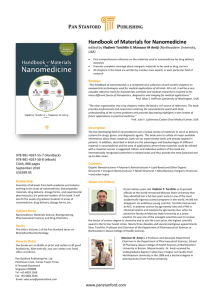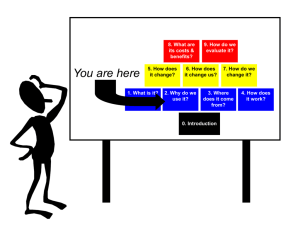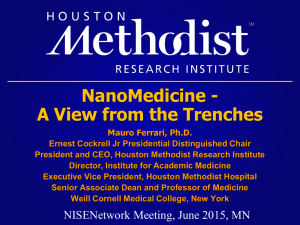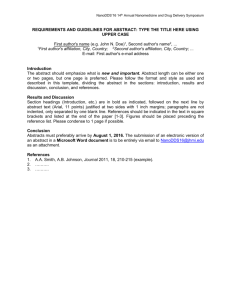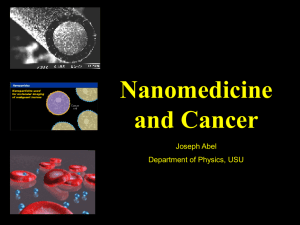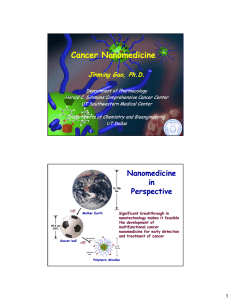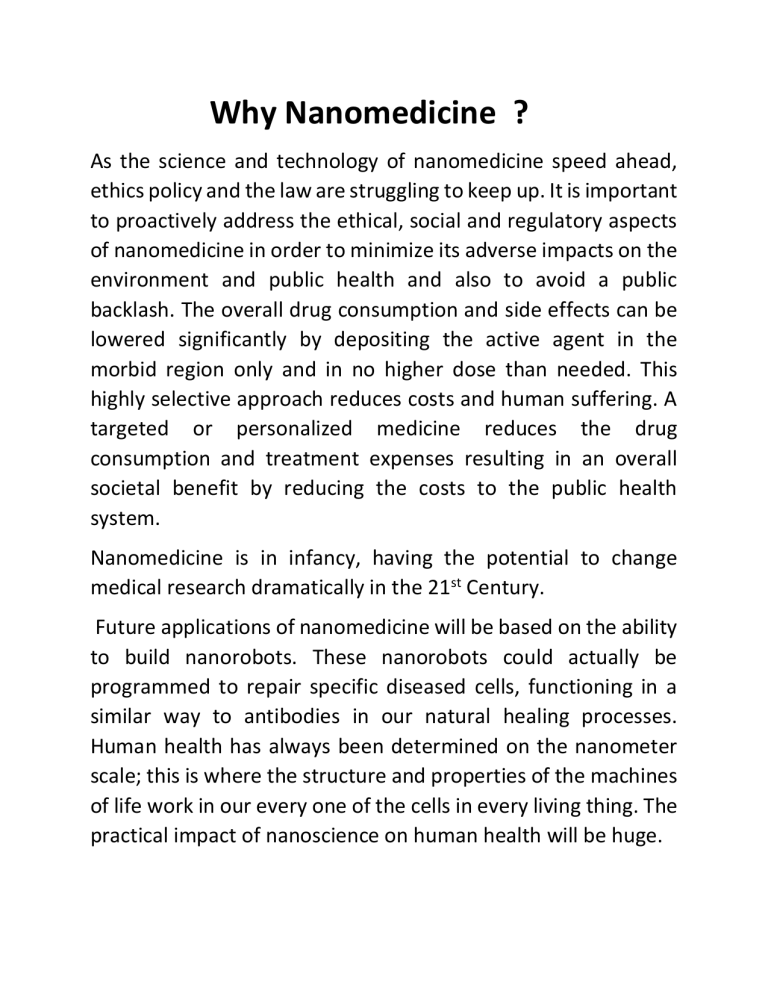
Why Nanomedicine ? As the science and technology of nanomedicine speed ahead, ethics policy and the law are struggling to keep up. It is important to proactively address the ethical, social and regulatory aspects of nanomedicine in order to minimize its adverse impacts on the environment and public health and also to avoid a public backlash. The overall drug consumption and side effects can be lowered significantly by depositing the active agent in the morbid region only and in no higher dose than needed. This highly selective approach reduces costs and human suffering. A targeted or personalized medicine reduces the drug consumption and treatment expenses resulting in an overall societal benefit by reducing the costs to the public health system. Nanomedicine is in infancy, having the potential to change medical research dramatically in the 21st Century. Future applications of nanomedicine will be based on the ability to build nanorobots. These nanorobots could actually be programmed to repair specific diseased cells, functioning in a similar way to antibodies in our natural healing processes. Human health has always been determined on the nanometer scale; this is where the structure and properties of the machines of life work in our every one of the cells in every living thing. The practical impact of nanoscience on human health will be huge. NANOMEDICINE Nanomedicine is an application of nanotechnology which works in the field of health and medicine with the help of nanomedicine early detection and prevention, improved diagnosis, proper treatment and follow-up of diseases is possible. Nanomedicine is the preservation and improvement of human health using molecular tools and molecular knowledge of the body. The particles size of such nanomaterials is typically 1-100 nm and such nanomedicines tend to result in increased bioavailability, decreased dose, improved drug efficacy and decreased toxicity. Application in Drugs and Medicine The major areas in which nanomedicine is being developed in cancer involve: early detection of tumor and cancer treatment. Nanotechnology can deliver medicine or drugs into specific parts of the human body, thereby making them more effective and less harmful to the other parts of the body. Anti-cancer gold nanoparticles have been found very effective. Gold “nanoshells” are useful to fight cancer because of their ability to absorb radiation at certain wavelengths. Once the nanoshells enter tumor cells and radiation treatment is applied, they absorb the energy and heat up enough to kill the cancer cells. Clearance Mechanism and opportunities for targeting The network of blood and lymphatic vessels investing the body provides natural routes for the distribution of nutrients, clearing of unwanted materials and delivery of therapeutic agents. When injected intravenously. Particles are cleared rapidly from the circulation and predominantly by the liver and the spleen macrophages. However, size and surfaces characteristics of nanoparticles both play an important role in the blood opsonization process and clearance kinetics. Larger particles (200nm and above) are more efficient at activating the human complement system and are hence cleared faster from the blood by kupffers cells than their smaller counterparts. Macrophages as a target The macrophage is a specialized host defense cell whose contribution to pathogenesis is well known. Alteration in macrophage clearance and immune effector functions contribute to common disorders such as atherosclerosis, autoimmunity and major infections. The macrophage, therefore, is a valid pharmaceutical target and there are numerous opportunities for a focused macrophagetargeted approach. Example: Although most microorganisms are killed by macrophages, many pathogenic organisms have developed means for resisting macrophage destruction following phagocytosis. Passive targeting of nanoparticles vehicles with encapsulated antimicrobial agents to infected macrophages is therefore a logical strategy for effective microbial killing.
